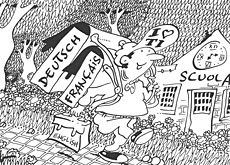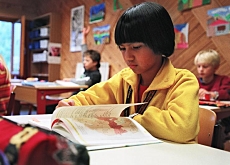Language poll challenges schools reform

Voters in Zurich are to have the final say on a proposal that would make English the main foreign language taught at cantonal primary schools.
The ballot in Switzerland’s most populous canton on November 26 comes amid efforts to improve educational coordination among the country’s different language regions.
Zurich is in many ways considered a leader in education matters among Switzerland’s 26 cantons, which largely determine their own schools policy. It has played a pioneering role in the introduction of English at an early age.
However, the Zurich electorate is not the first to decide on a proposal to give English preference over a second national language at primary school level.
Other cantons in the German-speaking part of Switzerland threw out similar plans at the ballot box earlier this year, some by a relatively small margin. It is expected that further votes, mainly in central Swiss cantons, will follow.
Multilingual Switzerland has four national languages – German, spoken by the majority, French and Italian as well as a tiny minority of Romansh speakers.
Until recently it has been the custom – in the name of national cohesion – for pupils to learn another national language at school. But many schools also want to teach English.
One foreign language
The Zurich initiative aims at focusing on one foreign language at primary school level and is supported by many teachers as well as political parties, including the rightwing Swiss People’s Party and some of the Green Party.
Currently pupils learn English from grade two. From grade five onwards they also have lessons in French – the second national language in Switzerland after German.
The initiative committee claims that many young pupils growing up with Swiss German dialect can’t really manage two foreign languages, partly also because they struggle with standard German.
“Surveys show that our primary school pupils don’t reach the expected expertise in German,” says Konrad Osterwalder, president of the Federal Institute of Technology in Zurich.
Osterwalder is supported by Remo Largo, a former professor of paediatrics and a distinguished author of books on education. He argues that it doesn’t make sense to teach two foreign languages for only a few hours each per week.
“Our schools put too much weight on languages at the expense of science subjects and creative activities,” he wrote in an article in Zurich’s Neue Zürcher Zeitung newspaper.
Easy learning
Other education experts disagree, maintaining that children learn two foreign languages easily at an early age and that expertise in their mother tongue improves at the same time.
Knowledge of more than one foreign language is a key to success in an increasingly global society, they add.
For her part, Zurich’s education director Regine Aeppli has warned that approval of the initiative could scupper plans to coordinate education among the cantons.
“The whole of Switzerland is watching Zurich,” she said.
Aeppli added that plans to introduce French after grade six only would cause tensions on a national level. “It could jeopardise linguistic cohesion,” she told the Tages-Anzeiger newspaper.
Two years ago the country’s 26 cantonal education authorities agreed on a common policy and standards at primary schools as part of a major package of reforms.
Aeppli is confident that voters will acknowledge the importance of foreign languages and previous efforts to harmonise the education system.
In a nationwide ballot last May, the electorate approved a constitutional amendment aimed at improving coordination among the different school systems and giving the federal authorities a bigger say.
swissinfo

More
Multilingualism
Under Switzerland’s federalist system the country’s 26 cantons enjoy a large degree of autonomy in education matters.
The Swiss education system is built on a complex interplay between the federal, cantonal and local authorities depending on the education level and the kind of institution.
English language teaching at compulsory school level has been a bone of contention in multicultural Switzerland for years amid concern that the four national languages German, French, Italian and Romansh might lose out.
The 26 cantonal education directors agreed in 2004 to adopt a policy of teaching two languages in primary school.
The policy stipulates that one should be English and the other a national language.
The ratification process for the accord is due to start at the end of 2007 and should be complete by 2009.

In compliance with the JTI standards
More: SWI swissinfo.ch certified by the Journalism Trust Initiative



You can find an overview of ongoing debates with our journalists here . Please join us!
If you want to start a conversation about a topic raised in this article or want to report factual errors, email us at english@swissinfo.ch.